Senior Program Officers Jacki Wilson and Keith Bowen, joined by Institute Executive Vice President Patricia Thomson, traveled to the heart of the Nuba Mountains to conduct USIP Professional Training Program’s eighth conflict resolution workshop for Sudan. The Nuba Mountains region was a central battleground throughout the North/South civil war. Working with the Badya Center for Integrated Development Services, a highly experienced local NGO partner (and USIP grantee), the training workshop gathered participants from the three areas mentioned in the Comprehensive Peace Agreement for special status: Abyei, Southern Kordofan, and Blue Nile.
Senior Program Officers Jacki Wilson and Keith Bowen, joined by Institute Executive Vice President Patricia Thomson, traveled to the heart of the Nuba Mountains to conduct USIP Professional Training Program’s eighth conflict resolution workshop for Sudan. The Nuba Mountains region was a central battleground throughout the North/South civil war. Working with the Badya Center for Integrated Development Services, a highly experienced local NGO partner (and USIP grantee), the training workshop gathered participants from the three areas mentioned in the Comprehensive Peace Agreement for special status: Abyei, Southern Kordofan, and Blue Nile.
The workshop’s primary objective was to build the participants’ skills to find sustainable, negotiated solutions to prevent conflicts from escalating. The seriousness of the workshop was highlighted by violence in Upper Nile, where several hundred people were killed during the course of the workshop. The situation reinforced the importance of building knowledge and skills to deal with the increasing uncertainty and anxiety over Sudan’s future.
The workshop provided training in frameworks and methods for analyzing conflict, negotiating more effectively, discussing traditional solutions and preventive measures, and practicing problem solving frameworks that could later be applied to their own local problems.
A secondary objective of the workshop focused on building relationships among parties who dealt with the full impact of the civil war. The difficulty in achieving this goal is exacerbated by the sheer size of Sudan. Many of the participants had never met someone from either of the two other geographic regions represented in the workshop. According to one participant, the most useful part of the program was “the relationships that have been developed among the brothers who attended this workshop—without exception.”
The Badya Center will maintain channels of communication and coordinate follow-up activities with participants in all three areas as the Institute’s local partner in the region. With eight paid staff and over fifty volunteers, the Badya Center has been involved in promoting peace and tolerance in Sudan for more than a decade. Their work includes the documentation of violence against women, publication of booklets on democracy and peaceful co-existence, conducting training sessions in outlying communities, and mediating local disputes. Under a USIP grant, the Badya Center will conduct a series of mediation sessions in the Southern Kordofan using methods and skills derived from this training workshop.



